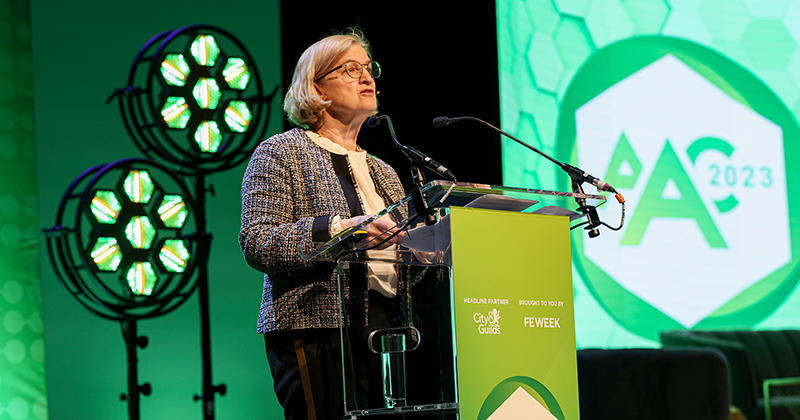Ofsted’s chief inspector has insisted the watchdog cannot “soft-pedal” on inspections, amid growing criticism that the impact of Covid-19 is not being considered by inspectors.
Amanda Spielman also told FE Week’s Annual Apprenticeship Conference that overuse of online learning and self-study can be a “toxic combination”, an issue that has grown since the pandemic.
FE Week has reported in recent months on a growing number of provider complaints that Ofsted is ignoring the impact of Covid-19 and associated lockdowns when it comes to training, particularly in the health, care and hospitality sectors. Some have tried and failed to challenge ‘inadequate’ grades and subsequent contract termination legally.
Spielman said that alleging that inspectors forget the context of the pandemic, disrupted employment market and economic uncertainty is “an easy one for people to reach for” when poor quality judgements are dealt.

She told AAC delegates today: “We do have concerns about some parts of the sector. We know the current environment is tough but it is our role to report on the quality of provision as we find it.
“We will always acknowledge the context, but we can’t soft-pedal on inspection. That wouldn’t be fair to you or to the apprentices you train.”
She added that by reporting “accurately”, Ofsted can “then make a case for systemic change when it is needed”.
During an interview with FE Week after her speech, Spielman said that Ofsted does “always take into account and tries to understand and give some weight, to context”, but added: “At the end of the day, we have to say what is there for the young people, is it good enough, and report honestly if it isn’t.
“We do understand why, given the consequences that are hung on inspection, [context] is something that people reach for, but we put a huge amount of effort into trying to get the balance right.”
‘It’s hard to start feeling like an adult from skanky bedrooms’
Spielman also expressed concerns about the educational experiences for apprentices post-Covid.
She said online learning and self-study can be part of an apprenticeship, but warned this can be a “toxic combination when overused or used too soon”.
“I know many of you balance these factors well but failing to do so can damage apprentices’ motivation and enthusiasm,” she told conference. “If an apprentice spends most of their first three months studying at home on their own, we can hardly be surprised if they drop out.
“It can be appropriate when it improves the apprentices’ experiences or prepares them for work in their chosen sector. But it shouldn’t be for your convenience or to save money.”
Spielman told FE Week the issue had become more prevalent since the pandemic when the switch to online learning was made, adding that the watchdog has found providers to be “reluctant” to move away from this method due to convenience.
“I’ve spoken about the socialisation of apprenticeships. Part of what you’re getting is that experience with your peers. It operates and acts more profoundly when you go through it with your peers, really shifting from childhood to adulthood in a work sense.
“I’ve talked about skanky teenagers and skanky back bedrooms before. It’s very hard to start feeling like an adult from a back bedroom.”













In my pretty large experience of chief inspectors of the FEFC, TSC, ALI and Ofsted, none would have used the term ‘skanky’ with regard to teenagers or back bedrooms. Other words suggested by google include:
abominable, awful, beastly, crappy, creepy, cruddy, crummy, detestable, distasteful, foul, funky, grody, gross, gruesome, hideous, icky, loathsome, lousy, nasty, nauseating.
I am appalled by the use of this term which reinforces stereotypes of teenagers by some in our society. As for the subject of the speech perhaps Ofsted would have fewer complaints if they actually tried to have inspection teams who had some subject expertise when they go into a one subject provider with hundreds of apprentices so that someone would know what they are talking about when making judgements on standards achieved by apprentices.
Absolutely right on both counts Phil. Apprentices are not skanky teenagers stuck in their bedrooms they are young people and adults employed and in the workplace learning specialist skills which require subject expert inspectors.
She added that by reporting “accurately”, Ofsted can “then make a case for systemic change when it is needed”.
In other words, there is an element of luck to Ofsted inspections, because of the timing.
As for the word ‘skanky’. Is using offensive and demeaning language a characteristic of adulthood?
Or in other words some providers will have to “take one for the team” in order to help achieve a better long term outcome for others.
That would depend on whether an Ofsted inspection is actually a proven mechanism which acts to improve long term outcomes, which often appears based on faith in maintaining the status quo. The bottom line is that we have persistent long term skills shortages in some areas, we’re told that low productivity is hampering the economy, we have decades long and growing wealth gaps / social mobility decreases. Perhaps it’s reasonable to question whether more of the same is part of the problem.
You could argue that constant change within inspection regimes consumes limited resources with no measurable long term benefit and the function of Ofsted is as much about preventing practitioners from challenging policy as it is about driving up quality.
Lets hope using the phrase skanky teenagers to describe young people initiates some reflection on how that sits within Ofsted’s owns code of conduct and the wider Civil Service values and code. If it is not called out, then the trend for divisive language will continue.
Last remarks well said. Young people and anyone who cares about post 16 education will be appalled by her use of degrading language that is used in sexual harassment. No wonder she is going. Still cannot believe this has not been picked up by the wider media.
After being on inspection last week, I hand on heart beleive that Ofsted no longer see people as people. The whole process is designed to dehumanise. One “learner” comments positively that they knew something prior to training but that it was filling gaps in knowledge, that’s poor sequencing, 80+ learners saying they are developing new skills and learning masses – well what do learners really know. Personally I found being referred to as only “nominee” to be hugely demeaning- I considered adopting the term “Lead Inspector” in my response, however I imagine that would have been seen as inadequate attitude and behaviour.